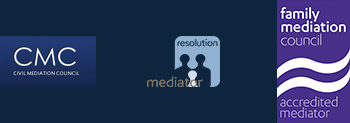Family disputes can be incredibly challenging, particularly when they involve issues such as divorce, child custody, and financial settlements. In the UK, non-court dispute resolution (NCDR) methods offer an effective alternative to traditional litigation, providing a more amicable, cost-effective and efficient means of resolving family law issues. These methods include mediation, collaborative law, and arbitration, each with its unique processes and benefits.
Mediation
Mediation is probably the most common form of NCDR in family law. It involves a neutral third party, known as a mediator, who helps the disputing parties communicate and negotiate to reach a mutually acceptable agreement. Mediators do not make decisions for the parties but facilitate discussions to help them find common ground. This process is confidential, allowing parties to speak openly without fear that their statements will be used against them in court.
The benefits of mediation are numerous. It is generally quicker and less expensive than court proceedings. It also allows the parties to maintain control over the outcomes, rather than having decisions imposed on them by a judge. Mediation can preserve relationships by reducing conflict and promoting cooperative problem-solving, which is particularly important when children are involved.
Early Neutral Evaluation
This is a process in which an independent and neutral expert on family law – generally an experienced practicing solicitor – looks at your circumstances and provides advice on what the Court might rule should the matter come to trial. The format can vary as sometimes it is done using documents alone, and sometimes there are meetings with the parties involved. Some practitioners offer a more formalised option which takes the form of a trial, and this is known as a Private Financial Directions Hearing, or PFDR.
The opinion of the evaluator is not binding on the parties, but it can offer great assistance in mediation or other settlement conversations.
Solicitor-led Negotiation
In this form of NCDR, the solicitors negotiate on behalf of their clients, usually by letter or email but sometimes in face-to-face meetings. The final decisions are still made by the clients, but the solicitors can use their skill and experience to assist in finding a suitable settlement which they can then offer advice on to their clients.
Collaborative Law
Collaborative law is another NCDR method where each party hires a specially trained collaborative lawyer, and all parties commit to resolving their disputes without going to court. The process involves a series of four-way meetings with both parties and their lawyers to negotiate and settle the issues. Other professionals, such as financial advisors and child specialists, may be brought in to assist.
One of the key advantages of collaborative law is the focus on reaching a solution that works for the whole family. The process encourages transparency, as all parties agree to share information openly and honestly. If the process breaks down and the parties decide to go to court, the collaborative lawyers must withdraw, encouraging everyone to work towards an agreement.
Arbitration
Arbitration involves a neutral arbitrator, typically a legal expert, who listens to both parties’ arguments and makes a binding decision. This process is more formal than mediation but still offers greater flexibility and confidentiality compared to court proceedings. The parties can choose their arbitrator and agree on the issues to be resolved, tailoring the process to their specific needs.
Arbitration can be faster and more flexible than going through the courts, with the added benefit of privacy. The binding nature of the arbitrator’s decision provides certainty and finality, reducing the potential for prolonged disputes.
Conclusion
Non-court dispute resolution methods offer valuable alternatives to litigation in family law cases. By opting for mediation, collaborative law, or arbitration, families can resolve their issues more amicably, preserving relationships and reducing the emotional and financial toll of court battles. These methods empower parties to find solutions that best suit their unique circumstances, fostering a more harmonious post-dispute future.


